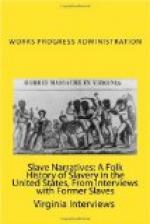“‘Now lissen,’ I tells ’er, ‘effen I comes home drunk, don’t you go t’ bressin’ ee[TR:?] out. Don’t you even tetch me; jes’ gimme a li’l piller an’ lemme go lay down on de flo’ somewheres. Atter I drop off t’ sleep, you kin tear de house down, and hit don’t botha me none. Wen I wakes up, I be all right.’
“Well, de fust time I come home full o’ likker she done ferget w’at I tell her, an’ staht shovin’ me. I done bus’ ’er on de jaw so pow’ful hahd hit lif’ her feet offen de flo’ an’ she lan’ in de corner on her haid. W’en I wakes up an’ sees w’at I done, I wish I could hit mahse’f de same way. F’m dat day on, we nevah had no mo’ trouble ’bout de likker question.”
The weight of years has at last cooled the hot blood, but a hint of departed swashbuckling days still glistens in the old eyes as he sits on his narrow porch and recalls scenes of the old days.
To one interested in the psychology of the Southern negro, this shriveled old man, with his half-bantering, half-pathetic attitude offers an interesting study. Borrowed from a page of history, he seems a curiosity, like a fossil magically restored to life, endowed with the power of speech, telling of events so deeply buried in the past that they seem almost unreal.
FEDERAL WRITERS’ PROJECT American Guide, (Negro Writers’ Unit)
Pearl Randolph, Field Worker
Jacksonville, Florida
November 35, 1936
ACIE THOMAS
Mr. Thomas was at home today. There are many days when one might pass and repass the shabby lean-to that is his home without seeing any signs of life. That is because he spends much of his time foraging about the streets of Jacksonville for whatever he can get in the way of food or old clothes, and perhaps a little money.
He is a heavily bearded, bent old man and a familiar figure in the residential sections of the city, where he earns or begs a very meager livelihood. Many know his story and marvel at his ability to relate incidents that must have occured when he was quite small.
Born in Jefferson County, Florida on July 26, 1857, he was one of the 150 slaves belonging to the Folsom brothers, Tom and Bryant. His parents, Thomas and Mary, and their parents as far as they could remember, were all a part of the Folsom estate. The Folsoms never sold a slave except he merited this dire punishment in some way.
Acie heard vague rumors of the cruelties of some slave owners, but it was unknown among the Folsoms. He thinks this was due to the fact that certain “po white trash” in the vicinity of their plantation owned slaves. It was the habit of the Folsoms to buy out these people whenever they could do so by fair means or foul, according to his statements. And by and by there were no poor whites living near them. It was, he further stated like “damning a nigger’s soul, if Marse Tom or Marse Bryant threatened to sell him to some po’ white trash. And it allus brung good results—better than tearing the hide off’n him woulda done.”




